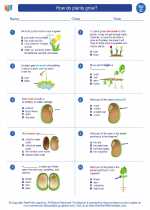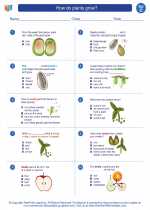How do plants grow? -> gametes
Gametes: An Explanation
Gametes are specialized reproductive cells that are responsible for sexual reproduction in organisms. In humans, gametes are the sperm cells in males and the egg cells in females. These cells are unique because they each contain half the number of chromosomes found in other cells of the body, and they join together during fertilization to form a new organism with a complete set of chromosomes.
During the process of meiosis, which is a type of cell division that occurs in the reproductive organs, gametes are produced. This process ensures that when the gametes combine during fertilization, the resulting organism will have the correct number of chromosomes.
It's important to note that gametes are haploid, meaning they contain only one set of chromosomes, as opposed to the diploid cells found elsewhere in the body, which contain two sets.
Study Guide: Gametes
- What are gametes?
Gametes are specialized reproductive cells responsible for sexual reproduction. In humans, sperm cells in males and egg cells in females are the gametes. - How are gametes formed?
Gametes are formed through the process of meiosis, a type of cell division that occurs in the reproductive organs. - What is the chromosome number in gametes?
Gametes are haploid, meaning they contain only one set of chromosomes, as opposed to the diploid cells found elsewhere in the body, which contain two sets. - What is the role of gametes in sexual reproduction?
Gametes combine during fertilization to form a new organism with a complete set of chromosomes, ensuring genetic diversity.
Understanding gametes is essential to comprehend the process of sexual reproduction in organisms. By grasping their role and formation, one can gain a deeper insight into the complexities of genetics and inheritance.
[Gametes] Related Worksheets and Study Guides:
.◂Science Worksheets and Study Guides Third Grade. How do plants grow?

 Activity Lesson
Activity Lesson
 Worksheet/Answer key
Worksheet/Answer key
 Worksheet/Answer key
Worksheet/Answer key
 Worksheet/Answer key
Worksheet/Answer key
 Worksheet/Answer key
Worksheet/Answer key
 Vocabulary/Answer key
Vocabulary/Answer key
 Vocabulary/Answer key
Vocabulary/Answer key
